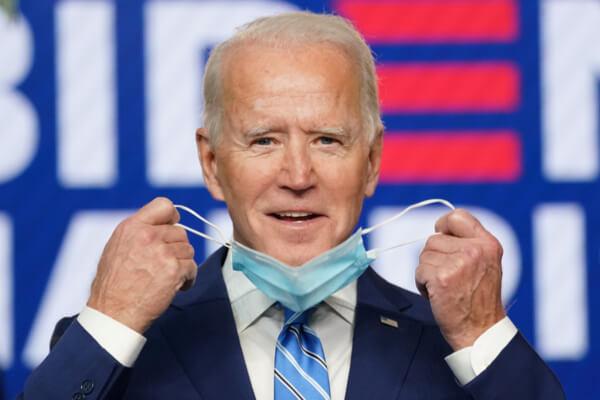Sixty years after the election of President John F. Kennedy, Joe Biden is positioned to be the second Roman Catholic president in the United States, after winning Pennsylvania and crossing the 270 electoral vote threshold.
“I’m a practicing Catholic. I believe faith is a gift. And the first obligation we all have is, ‘Love your God,’ the second one is, ‘Love your neighbor as yourself,’” Biden says of his faith on his campaign website. The president-elect’s religion and theology had been a central part of his pitch to “restore the soul of America,” which has been reflected in his schedule, policy, and statements from the campaign trail.
The Biden campaign has emphasized where his policy proposals are influenced by his faith. Its website connects Biden’s Catholicism with policy proposals like raising the federal minimum wage to $15 an hour, saying that Biden would “build an economy where everyone comes along and we protect the ‘least of these.’”
Biden also cited Pope Francis’ Laudato Si' encyclical in addressing the climate crisis and said he would ensure that “communities harmed by climate change and pollution, particularly communities of color and low-income communities, are the first to benefit from [Biden’s] clean economy revolution.”
Biden spoke at length about his faith during the campaign. He regularly points to faith as what helped him process the death of his first wife and daughter, and the death of his son Beau in 2015. In a CNN town hall Biden quoted the theologian Søren Kierkegaard and said that faith “gives [him] some reason to have hope and purpose.” In an op-ed for the Christian Post he described how the Great Commandment had influenced his life and quoted Dietrich Bonhoeffer. And when speaking with the Poor People’s Campaign, Biden said the group reminded him of what scripture describes as “a calling born out of the wilderness.”
“A calling to serve, not to be served. A calling toward justice, healing, hope — not hate,” Biden said. “To speak the good news, and followed by some good deeds. It's not just enough to speak the good news, but good deeds."
While campaigning, Biden maintained regular church attendance, include attending Mass on Ash Wednesday three days before his primary win in South Carolina and on Election Day in Wilmington, Del.
“He’s a practicing Catholic … Even when we’re traveling, he goes to Mass or he attends a Christian worship service,” Rev. Michael McClain, the faith outreach coordinator for Biden’s campaign in South Carolina and multiple other states told Sojourners in February.
In 2008, Biden became the first Catholic vice president. His term as vice president spanned through the end of Pope Benedict XVI’s papacy and the beginning of Pope Francis.’ When visiting the Vatican in 2014, Biden defended NETWORK, the Catholic lobbying group led by Sister Simone Campbell.
“You are being entirely too hard on the American nuns,” Biden said after Benedict XVI asked for Biden’s advice, according to The New York Times. “Lighten up.”
During a 2016 event at the Vatican, Biden thanked Pope Francis for comforting him and his family after the death of Beau Biden.
"I wish every grieving parent, brother or sister, mother or father would have had the benefit of his words, his prayers, his presence," said the vice president, according to the National Catholic Reporter. "He provided us with more comfort than even he I think will ever understand."
The recognition of Biden’s faith may serve as a microcosm of shifting views of progressive faith in America. When Biden was elected vice president, his support of the Democratic Party’s policy on abortion caused some to question his faith. Even in 2016, the University of Notre Dame was criticized for honoring Biden with the Laetare Award.
“The (Catholic) Church has continually urged public officials, especially Catholics, of the grave and clear obligation to oppose any law that supports or facilitates abortion or that undermines the authentic meaning of marriage,” Bishop Kevin Rhoades said in a written statement issued at the time. “I disagree with awarding someone for ‘outstanding service to the Church and society’ who has not been faithful to this obligation.”
But the example of Pope Francis, who told Biden he was “always welcome” at the Vatican, has inspired more left-of-center Catholics to be vocal about how their faith influences their politics. Rep. Nancy Pelosi (D-Calif.) told reporters that she prayed for President Donald Trump everyday and Rep. Alexandria Ocasio-Cortez (D-N.Y.) has highlighted the Catholic commitment in numerous areas, including penning an essay on faith and prison reform for America magazine.
While Biden’s faith-driven policy is evident, the president-elect has been clear that his commitment to the faith isn't to proselytize. Biden says his faith is cultural, theological, and personal.
“I’m as much a cultural Catholic as I am a theological Catholic,” Biden wrote in his book Promises to Keep: On Life in Politics. “My idea of self, of family, of community, of the wider world comes straight from my religion.”
Got something to say about what you're reading? We value your feedback!





